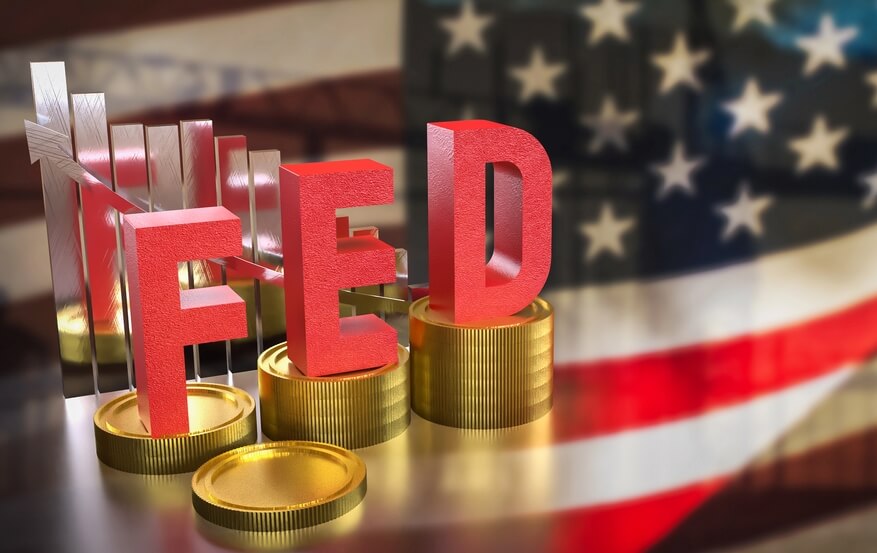Fed June Meeting Preview: The First Dot Plot Since Trump’s Tariffs – What Changes and What Doesn’t
- Bitcoin Drops to $70,000. U.S. Government Refuses to Bail Out Market, End of Bull Market or Golden Pit?
- Gold rallies further beyond $5,050 amid flight to safety, dovish Fed expectations
- Bitcoin Bottom Debate: $70,000 or $50,000?
- A Crash After a Surge: Why Silver Lost 40% in a Week?
- Bitcoin Slips Below 75,000 Mark. Will Strategy Change Its Mind and Sell?
- Bitcoin Rout. Bridgewater Founder Dalio Publicly Backs Gold.

TradingKey - On Wednesday, June 18, the Federal Open Market Committee (FOMC) will announce its latest monetary policy decision. Markets widely expect the Federal Reserve to keep interest rates unchanged, with the federal funds rate likely to remain at 4.25%–4.5% for the fourth consecutive meeting since the last rate cut in December 2024.

United States Fed Funds Interest Rate, Source: TradingKey
The key focus of this meeting will be the release of the Quarterly Summary of Economic Projections (SEP) — including the updated dot plot — which will mark the first such projections since the Trump administration imposed tariffs on a wide range of imports.
Why the Fed Will Stay on Hold
Deutsche Bank analysts argue that maintaining the status quo remains the most rational course for the Fed at this stage. Economist Brett Ryan noted, “Why deviate from it now when there’s no pressing reason to do so and with still upside risk to the inflation outlook?”
Recent data shows mixed signals:
U.S. CPI YoY rose to 2.4% in May from 2.3% in April, slightly below expectations.
Core CPI YoY remained steady at 2.8%, below the expected 2.9%, suggesting that the inflationary impact of tariffs has not yet materialized clearly.
Nonfarm payrolls increased by 139,000 in May, slightly below the forecast of 126,000, while the unemployment rate held steady at 4.2%.
Eastspring Investments economists said the Fed is right to take a wait-and-see approach, although policymakers should be concerned about some recent signs of rising inflation expectations.
Trade Policy Uncertainty Looms Large
The uncertainty surrounding U.S. trade policy remains a key factor influencing the Fed's inflation outlook. The U.S. is currently in the 90-day tariff pause period initiated on April 9, during which trade negotiations with the EU, Japan, and others are ongoing.
Although the U.S. and China have reached a trade framework agreement, and a U.S.-UK trade deal was finalized, analysts warn that U.S. trade policy remains subject to potential shifts.
In early June, Fed Governor Christopher Waller said that Trump tariffs could temporarily push up inflation, but the Fed might choose to look through these short-term effects, leaving room for rate cuts later this year.
Waller added, "I see downside risks to economic activity and employment and upside risks to inflation in the second half of 2025, but how these risks evolve is strongly tied to how trade policy evolves."
Could the Fed Have Cut Rates This Month?
Market expectations for Fed rate cuts in 2025 have shifted significantly — from multiple cuts earlier anticipated to just one or two, and even brief discussions of rate hikes due to tariff-related inflation concerns.
On June 17, Wall Street Journal’s Fed watcher Nick Timiraos wrote that there would have been a case for cutting rates this week, had it not been for the inflation risks posed by tariffs.
He noted that the Fed is in watch-and-wait mode. Policymakers don't want to make a mistake — they’re weighing which risk is more pressing and costly: rising inflation expectations or labor market volatility.
UBS economist Alan Detmeister added that if everyone expects inflation to rise, then it probably will — exactly what the Fed fears.
Given that the economic outlook remains highly uncertain, major financial institutions have shown significant divergence in their expectations for U.S. interest rate cuts.
Goldman Sachs expects that the Federal Reserve may cut interest rates only once this year, likely in December. ANZ Bank anticipates that signs of weakening in the U.S. labor market will become more evident in the coming months; thus it believes the Fed could cut rates three times this year.
What to Watch in the Dot Plot
Following the FOMC meeting, the Fed will release its updated economic forecasts. The last SEP, released before the full implementation of Trump’s tariffs, showed:
Downward revisions to GDP growth over the next three years
Slight increases in unemployment and inflation forecasts
A note that uncertainty around the economic outlook has risen
J.P. Morgan expects that progress in trade talks may lead the Fed to revise its economic growth lower and inflation higher compared to March forecasts.
However, Deutsche Bank believes the Fed may shift its language from saying “uncertainty has increased further” to “uncertainty remains elevated” , reflecting a slight easing of tensions.
As global trade tensions ease, major Wall Street banks are adjusting their economic outlooks for the U.S. Goldman Sachs lowered the 12-month recession probability from 35% to 30%, raised GDP growth forecast from 1.0% to 1.25%, and expected peak unemployment to hit 4.4%.
Read more
* The content presented above, whether from a third party or not, is considered as general advice only. This article should not be construed as containing investment advice, investment recommendations, an offer of or solicitation for any transactions in financial instruments.





